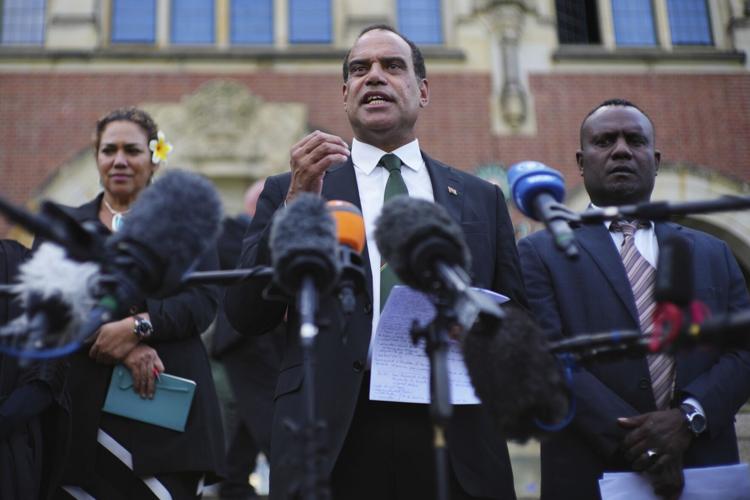THE HAGUE, Netherlands (AP) — The United Nations' top court has issued a landmark advisory opinion on climate change, its 15-black-robed judges weighing in for the first time on what the court's president called “an existential problem of planetary proportions that imperils all forms of life and the very health of our planet.”
The International Court of Justice's unanimous non-binding opinion, which runs to over 500 pages, was immediately hailed by activists as a turning point in international climate law.
After years of lobbying by island nations who fear they could disappear under rising sea waters, the U.N. General Assembly asked the court in 2023 to answer two questions: What are countries obliged to do under international law to protect the climate and environment from human-caused greenhouse gas emissions? And what are the legal consequences for governments when their acts, or lack of action, have significantly harmed the climate and environment?
Here are some of the key points from the opinion delivered Wednesday.
A healthy planet is a basic human right
In a simple statement that could have profound legal ramifications, the court said everyone is entitled to a habitable planet.
“The human right to a clean, healthy and sustainable environment is therefore inherent in the enjoyment of other human rights,” court President Yuji Iwasawa said during a two-hour hearing.
A livable planet is a human right and is part of international customary law, meaning every country is obliged to protect it, not just countries that have signed climate treaties and other agreements.
Violating international law
A failure to address climate change, the court said, could be a violation of international law.
That matters because it applies to all countries and paves the way for legal actions, including states returning to the ICJ to hold each other to account; domestic lawsuits; and investment agreements that have to conform to international law.
“With today’s authoritative historic ruling, the International Court of Justice has broken with business-as-usual and delivered a historic affirmation: Those suffering the impacts of climate devastation have a right to remedy and full reparation,” said Joie Chowdhury, a senior attorney at the Center for International Environmental Law.
Payback time?
The court ruled that some countries or individuals suffering from the effects of climate change could be eligible for compensation.
For climate damage linked to greenhouse gas emissions, “restitution may take the form of reconstructing damaged or destroyed infrastructure, and restoring ecosystems and biodiversity,” the court said.
If that’s not possible, financial compensation could be assessed, though the judges conceded it “may be difficult to calculate, as there is usually a degree of uncertainty with respect to the exact extent of the damage caused.”
Activists hailed that part of the decision as a historic turning point in their search for justice.
“The ICJ’s decision brings us closer to a world where governments can no longer turn a blind eye to their legal responsibilities. It affirms a simple truth of climate justice: Those who did the least to fuel this crisis deserve protection, reparations, and a future,” said Vishal Prasad, director of Pacific Islands Students Fighting Climate Change.
Climate refugees
While the court’s opinion is far-reaching, no one expects it to immediately solve the problems created by climate change.
The judges noted that people may be forced to flee their homes to escape the dangers posed by climate change and countries are obliged to not turn away climate refugees when their lives are endangered. If a country disappears under rising ocean levels, that country doesn’t cease to exist, they said.
For the Pacific Island nations that pushed for the opinion, the threat is real. Since 1993, sea levels around Vanuatu’s shores have risen by about 6 millimeters (.24 inches) per year — significantly faster than the global average — and in some areas, tectonic activity has doubled that rate.











